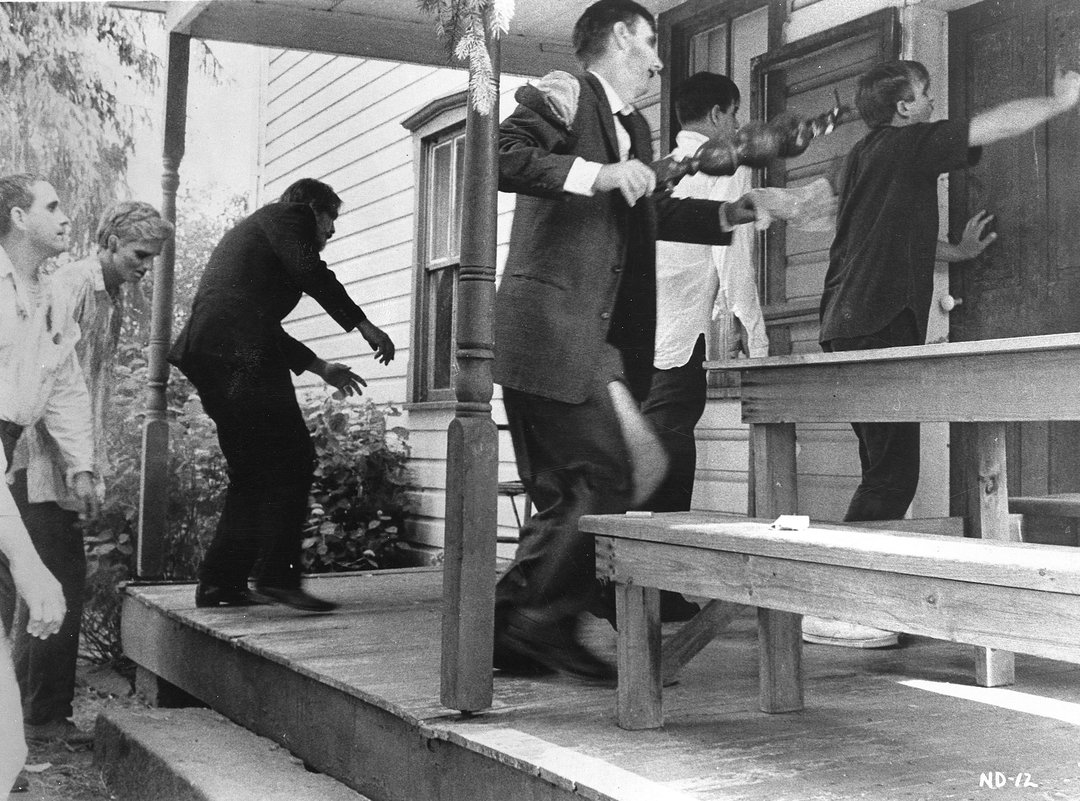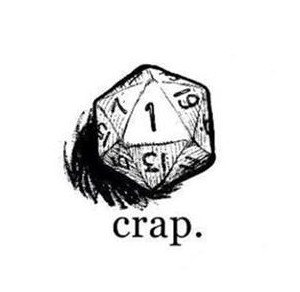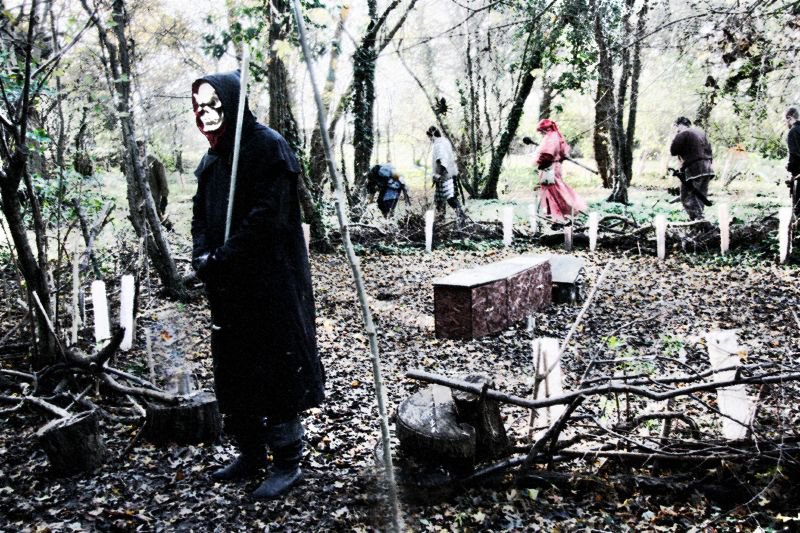Everyone dies. Every thing dies. In general, all things you love and care about are going to disappear at some point, and f or whatever reason, humans tend to deal with it oddly. We can’t conceptualize it well. We try, but it’s hard to figure out death when one half of the equation is hidden behind the shroud of, “Is there an afterlife or do we cease to exist? Who knows, but you will fight many wars over it.”
This is where entertainment comes in. We write stories to deal with reality: we kill some people, we give other people their happy ending, and hopefully someone leaves your adventure bawling their eyeballs out. In the world of carefully constructed endings, death is a reminder of what was lost, of what was sacrificed, or occasionally, asking whether it was worth it in the end.

Zombies keep being so popular decade after decade for a reason.
Tabletops, RPGs, and LARPs are very rarely anything like that. Death happens because someone misrolls three times in a row, or because you decided to press the button that said ‘do not press’. The meaning and symbolism don’t really show up as much, because of the context of it being a game. Sometimes it's hard to talk about deeper meaning when people's characters are running around screaming like maniacs, looting whatever they see.
In this sense, the deaths that take place in tabletops and LARPs mirror real life: They will happen for random and stupid reasons, many of which could have easily been avoided some with hindsight and a bit of luck. However, deaths in tabletops and LARP are unique in the sense that rarely does one get to see themselves die (as far as we know). While some players will take gleeful excitement in making character #54 in the death gauntlet conga line, there are swaths of players who will nurture their second self, giving them hopes and aspirations, personalities they enjoy playing, and all sorts of layered wish fulfillment. Tabletop games mean that some players invest in books and miniatures, monetarily speaking, but LARPers can easily be spending around fifty dollars an event to be able to play their character.
Is it any wonder then, that death can often be one of the biggest drama makers in game? To be told ‘sorry, all those things you liked to do, all those things you liked to be? You can’t be that anymore, all those months and money you invested don’t matter: it’s gone, start over,’ in any other situation would seem sadistic at best. Yet, we expect it in gaming, and for some, it’s the sole rush of the game. Because your character, your personal avatar, can die, and there is nothing you can do to get it back. It’s all the danger of life and death, without the actual life and death.
So then, what’s the issue here? People die in game. They mourn. They get sour. They move on, either permanently, or with a new character. It should be simple, right? Well, mister robot, humans are not simple at all. Let’s face it, what’s going to happen when the only reason you died was because the healer decided to act ‘in character’ and run in the other direction despite being two feet away from your bloody carcass? Or the GM didn’t tell you that the boss at the end of the dungeon was unbeatable because you forgot to loot the one chest in the one corner of the room you skimmed over? Those reasons suck. And since you as the player are not actually in an afterlife, or a vast void of nothingness, you are perfectly healthy enough to stew and rage over the fact that this all could have been avoided if the situation hadn’t been so stupid.

This is the crux of the problem. How do you deal with death in game? When is death justified? When is it cheap? Is it wrong to make death not a threat in game? Is it wrong to not give characters second chances?
Well, the easy answer is ‘it depends’. Sometimes, a death is a great way to make a storyline have some real meaning and gravitas; if your game is heavy in plot, death being possible raises the stakes. In some games, where plot is light and this just might be your weekly meet up with friends to have some fun and kill some orcs, maybe death is more of a buzzkill than anything. Of course, some nihilistic jerks will just get together for a game of first edition Dungeons and Dragons, make a bunch of first levels, and see which one makes it to the end of the dungeon (usually there is alcohol involved, or so I have heard).
However, there are some hard limits that can be applied. For example, having death be completely unavoidable is often not a good idea. No matter how grim and gritty your campaign is, there is usually a good idea to leave some sort of back door option, be it resurrection, be it a healing period, or merely the occasional GM grace. Why? Well, because these games don’t take place in real life. No matter how good you are at setting the scene and explaining the world, no one is ever going to be thinking one hundred percent in character. They are aware, more or less, that they are in a story, and will always metagame appropriately. Strange NPC who is asking them for a quest? If it’s the only one they’ve encountered, of course they’re going to help, otherwise there is no story or adventure! Friend’s PC dies, and they need to introduce a new one, but they kind of suck at roleplaying, so they act strangely? You’re still going to let them in the party (albeit maybe with suspicious banter involved), because otherwise you’re basically saying your friend isn’t allowed to play the game.
We make these excuses in logic because it lets the game work. And as a GM, it’s fair to do the same thing. Which isn’t to say you should stop the first death you see and say, “Welp, have to save you now, that’s how being a good GM works!”. It involves considering the context, relaxing your gameplay when needing to, and possibly making it worse if the players really are hankering for a murderkill gauntlet of doom.

If you are busy trying to be a hero or a villian, death is probably going to be hanging out around you; don't be surprised when he shows up.
Another important thing to know is: be aware that no matter what type of death system is in play, not everyone will be happy. Someone will want it more hardcore, or more relaxing, or both at the same time. You can’t make everyone satisfied, so stick to the people you want to be satisfied. If you’re in charge of a tabletop, a great way to finding a middle ground is incorporating other problems into the plot. Stealing from characters, maiming characters, subtracting from their stats are all viable ways of giving players a shock to their system, and not take away their character. But, just like death, too much of it can lead to desensitization and annoyance. If everyone in your party has lost an arm and half their health, it doesn’t really become a significant event anymore. It’s also extremely important that you at least have a minor discussion about the tone of a 'grimdark' campaign, and of things getting a little grittier: things like torture can be a touchy subject, and not everyone will be up for hearing about it, let alone roleplaying it extensively.
Let's keep in mind the fact that human emotions are an inevitability; for both the GM and players, there needs to be an understanding that someone might be fine, or might react terribly. Alternatively, they might be calm, but hold bitter resentment for a period of time. These reactions are natural, and shouldn’t be scorned, unless they are hurting the game. This is where the player aspect comes in: Your PC has permed (that’s ‘perma-death’ for those not in the know), and for whatever reason, you’re mad, you’re sad, you don’t feel invested in the game anymore. That doesn’t mean you have to be perfectly calm and detached from the world you’ve spent so much time in, but it is your responsibility to know what you’re feeling, and how to deal with it. There is nothing wrong with taking a break. There’s nothing wrong with missing a meet up (so long as you tell them ahead of time) to get your head together.
Furthermore, there is nothing wrong with telling other people about your issues, so long as you don’t interrupt the game to do so. Waiting until a break, or waiting until the event is over entirely, are two ways to go about this. If you do end up harming game progress, that’s not necessarily a bad thing either. What’s important is apologizing, acknowledging your emotions were at a high, and explaining that you intend to be better about it in the future. It might be tempting to find other gamer friends outside the game and tell everything to them, but there are some downsides to this. For one, your friend will most likely be unendingly sympathetic, and that will feel great, but it can often create an echo chamber where your feelings of resentment and injustice will just grow and grow. They also might also not understand exactly what your death meant to you. Alternatively, it might be tempting to find a group of people in game who agree with you; this can be better or worse. It means you might have people who understand the context, and even better, help to make the game better. Give your PC a better send off, avoid gaffes, or just make sure that you’re doing well as your new PC. But the other problem is that as a result, it can mean that bullying will occur. If everyone agrees that the other guy was a jerk for not healing you, it might not be a fun time for that guy in the future.
While it might seem invigorating to blame the bad healer - and sometimes it will be their fault - you don't want isolate someone who actually didn’t do anything wrong. In LARPing, where people will literally flee from the battlefield, it could be quite possible that they were out of magic, or that they had so little health that even going near you would have sealed both of your fates. Perhaps they were acting in character, where they disagreed with your PC on religion, on violence, or on some fact that made them not want to help you. Should a person have to forsake their beloved character for the sake of another person’s character? It’s debatable, but it definitely doesn’t mean the person is entirely at fault.
Or they did make a mistake. They misjudged. They panicked. What should you do then? Well, probably not talk about them behind their backs. You should talk to them instead. Discuss the fight, find out what their viewpoint was. Give them some pointers if they honestly messed up. And if they honestly were being a jerk, for whatever reason? Then you deal with it out of game. You talk to your GM about the issue. If it's a large LARP game, you make sure to never be near that person again. If it's a small RPG game, you might need to find a different group to play with for a while. You consider if that person is ruining your entire experience, and what ways you can deal with it in the future. And, unfortunately, you move on. People do stupid things in games like these, sometimes not even out of malicious intent. You can be bitter, harbor resentment, never interact with that person again if it’s really that bad, but you do have to find other things that give you joy and happiness. These emotions aren’t mutually exclusive. You don’t have to let go of your hurt feelings to be happy, you just have to make sure they are prioritized. This is for a game after all; never lose sight of that.

Fake Bad Life-or-Death Decisions are better than Real Bad Life-or-Death Decisions!
So, what if it is the GM, or someone in charge? It’s a much trickier situation, especially if you’re dealing with only being able to have access to one or two GMs and games at most. The amount you can be picky drops severely. Entire games can stop because of a problem player, but a problem GM is even worse, because GMs have power. They control the flow, they control the world, they control who gets the spotlight.
An entire article on its own could be written on how to deal with GMs, so this will be a shortened version. While it is a good idea to talk with the Powers that Be, depending on the size (especially if you LARP), you could easily get drowned out by dozens of other voices, all complaining. There are multiple solutions to consider. First is to get your group of friends together again. Have them keep an eye out for other problems that might be symptomatic of the same issue. Keep tabs, and present it when you have more evidence, and when you have a clearer head. It’s always a good idea to wait a bit. You will never get your death fixed, barring extraordinary circumstances. If you seriously want to blame The Powers That Be, you need to put that spite and annoyance to good use, and try and improve the situation for everyone in game. In smaller groups, talking to the GM one on one with a mediator is also a possibility, similar to the talk with the problematic player above. Learn their side, figure out how much of it really was just bad luck.
Finally, you have the decision to make. Is the sadness you experienced outpaced by the happiness and enjoyment? If not, then there’s no shame in admitting a game might not be for you. This might be your avatar's life and death, but it is for your fun. There are other games out there, of all shapes and sizes.
LARPs and tabletops are a huge investment. Our emotions run high from success, from failure, and from knowing that we saved the kitten out of the volcano. We feel like heroes, we feel like badasses, we feel clever, we feel excited. And sometimes, we feel depressed to all hell. Even a normal game can cause feelings of sadness, just because the high wears off. Now it’s a game where one of the most unexpected events happen, changing every long term plan you’ve had since the game started? That’s a big deal!
That’s why it’s so divisive, and that’s why there are dozens of systems made to make death a viable threat, without it scaring away players. Permanent death is one of the most effective tools to use in any tabletop, and that’s not even getting into how NPC deaths work or how to incorporate them into the plot. It’s also a unique tool, as it’s the only one that can halt our progress in its track without fail. Is it any wonder so many of us get it wrong? If there’s one final thought to leave with, perhaps it should be this: in whatever form death takes in your games, let it be an addition to the story, building it up to something greater than it was before. Always be looking forward, even when you find yourself looking back. A death you remember, a death you can share stories about with your friends, here in reality? That's a good death.
Remember a particular character death from your LARP or RPG? Was it a good experience or a bad one? Tell us about it here! Want more articles on Tabletops and LARPs? Let us know, and find us on Facebook or Twitter to follow us for all of our newest articles!